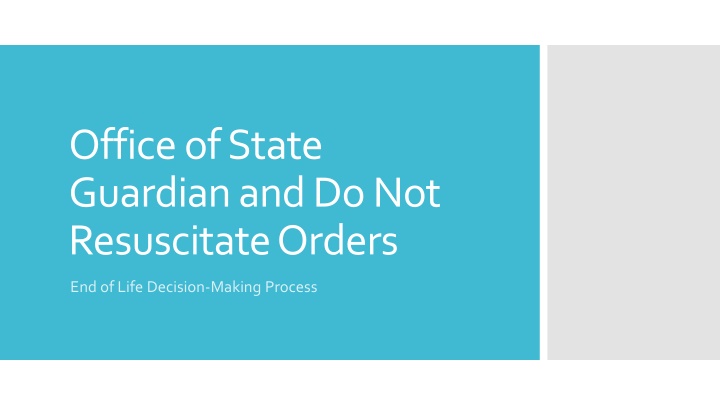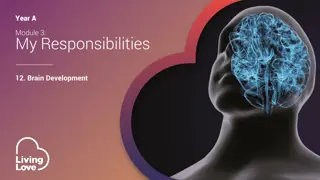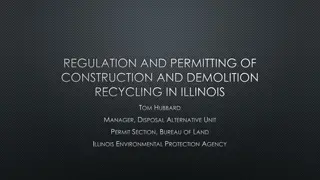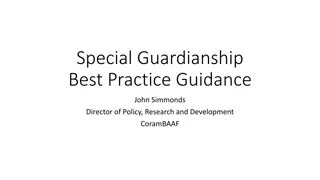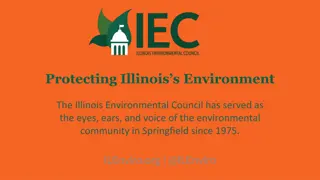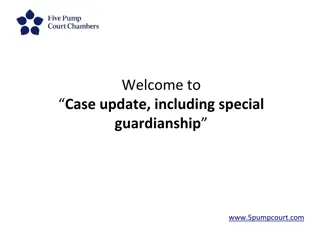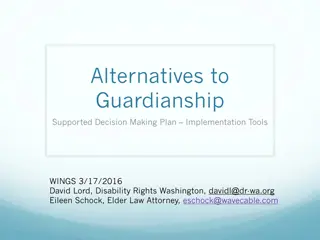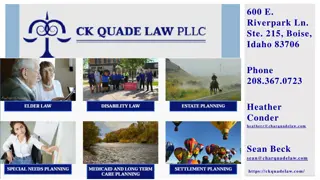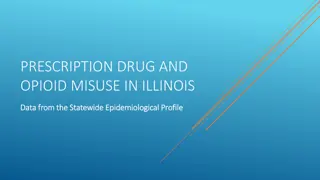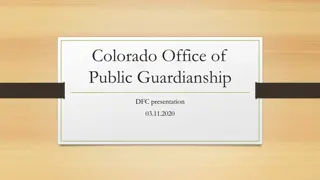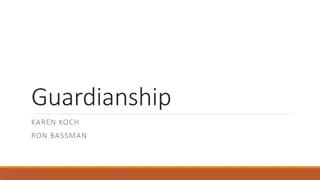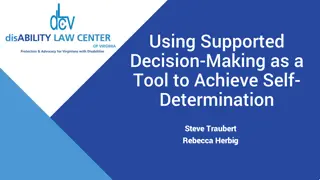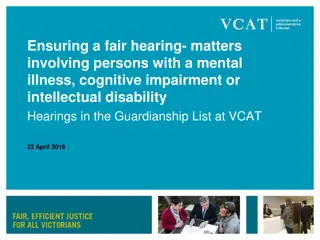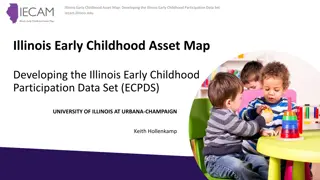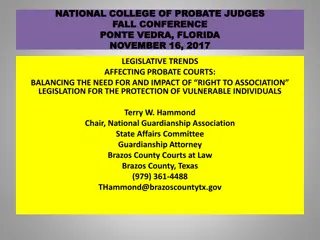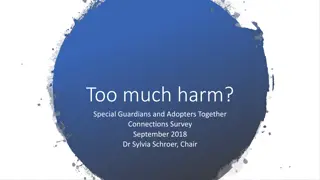Guardianship and Decision-Making in Illinois
In Illinois, guardianship plays a crucial role in decision-making for individuals who are unable to manage their affairs. The Office of State Guardian (OSG) and Public Guardians in Illinois serve as guardians, ensuring the well-being of wards. Guardianship for adults with disabilities is governed by the Probate Act, with courts appointing guardians to make decisions in the ward's best interest. Different types of guardianship, such as guardian of the person or estate, provide varying levels of authority. Understanding these processes is essential for protecting vulnerable individuals in need of support.
Download Presentation

Please find below an Image/Link to download the presentation.
The content on the website is provided AS IS for your information and personal use only. It may not be sold, licensed, or shared on other websites without obtaining consent from the author.If you encounter any issues during the download, it is possible that the publisher has removed the file from their server.
You are allowed to download the files provided on this website for personal or commercial use, subject to the condition that they are used lawfully. All files are the property of their respective owners.
The content on the website is provided AS IS for your information and personal use only. It may not be sold, licensed, or shared on other websites without obtaining consent from the author.
E N D
Presentation Transcript
Office of State Guardian and Do Not Resuscitate Orders End of Life Decision-Making Process
OSG is an agency of the State of Illinois that serves as guardian of last resort for individuals who have no one willing and able to serve as guardian. (20 ILCS 3955/31) Office of State Guardian (OSG) OSG operates throughout the State of Illinois and serves as guardian to about 5,000 wards.
Public Guardians in Illinois are appointed at the county level. A Public Guardian will serve as guardian for an individual who has assets greater than $25,000. (755 ILCS 5/13-5) Cook County Office of Public Guardian (OPG) is very active in adult guardianship. Other Guardians Private guardians are often a friend or family of the ward willing to serve as guardian and appointed by the Probate Court. Private guardians must comply with the Probate Act and related laws. All guardians are appointed by a Probate Court and have a court order of appointment and letters of office issued by the clerk of court.
Guardianship for Adults with Disabilities is governed by the Probate Act. (755 ILCS 5/11a-1 et. seq.) A Probate Court determines that an adult is unable to manage his or her person or financial affairs by clear and convincing evidence before appointing a guardian for that person. What is Adult Guardianship? Guardians make decisions for the ward by conforming as closely as possible to what a ward would have chosen themselves. (755 ILCS 5/11a-17(e)) This decision-making process is known as substituted judgement and should be used unless it would result in substantial harm. If substituted judgment cannot be used, the guardian should act based on the best interest of the ward.
Courts may appoint a guardian of the person, the estate, or both. A guardian of the personmakes decisions about a ward s medical care, residential placement, and other personal decisions. 755 ILCS 5/11a-17) Types of Guardianship A guardian of the estatemakes decisions about a ward s income and assets. 755 ILCS 5/11a-18) If there is a valid Power of Attorney (PoA) for healthcare and/or property, the agent under the PoA makes all decisions authorized. The guardian only has authority to make decisions for matters not delegated to the agent under the PoA. (755 ILCS 5/11a-17(c))
Guardianship appointments can be Temporary, Limited, or Plenary. Temporary guardianships are short-term emergency court orders. The guardian only has the authority expressly granted in the order, which is usually tailored to meet the needs of the ward. (755 ILCS 5/11a-4) Types of guardianship authority Limited guardianships are long-term appointments in which the guardian only has authority as granted by the Court. (755 ILCS 5/11a-14) Plenary guardianships are long-term appointments in which the guardian has all authority as defined by the Probate Act. (755 ILCS 5/11a-17, 18)
The Uniform Practitioner Order for Life-Sustaining Treatment (POLST) Form allows anyone to specify their choices for life- sustaining treatment. (755 ILCS 40/65) POLST forms are voluntary. Illinois Department of Public Health (IDPH) publishes a standard POLST form on its website. POLST forms A healthcare professional may presume, absent evidence to the contrary, that a completed IDPH POLST form is valid. (755 ILCS 40/65(d)) OSG may complete a POLST form in conjunction with a DNR, but the POLST and DNR must be consistent.
HCSA provides the legal basis for a guardian to make end-of-life decisions for a ward. (755 ILCS 40/1 et seq.) Health Care Surrogate Act (HCSA) If the guardian has Temporary or Limited authorities, the court order must expressly state that the guardian has authority to make decisions pursuant to HCSA. Plenary guardians have HCSA authority pursuant to the Probate Act.
In order to consent to forego life-sustaining treatment, the HCSA has specific requirements. (755 ILCS40/20(b)) 1. Lack of decisional capacity: Decisional capacity means the ability to understand and appreciate the nature and consequences of a decision as determined by the attending physician. Requirements for a DNR under the HCSA 2. A qualifying condition which is defined as a terminal condition, permanent unconsciousness, or incurable/irreversible condition. 3. Completed by an attending physician and concurred with by a qualified health care practitioner, which includes physicians, advanced practice registered nurses, physician assistants, and qualified residents. (755 ILCS 40/10) The physician and qualified health care practitioner must be licensed in Illinois or the state where the patient is being treated.
The HCSA defines the priority of available decision makers when there is no Power of Attorney: 1. Guardian of the person 2. Spouse Priority of Surrogate Decision Makers 3. Adult child 4. Parent 5. Adult sibling 6. Adult grandchild 7. Close friend 8. Guardian of the estate (755 ILCS 40/20)
Difference between POLST and DNR A POLST can be completed at any time. The POLST is a helpful advance planning document. A DNR pursuant to the HCSA requires that the individual lack decisional capacity and have a qualifying condition. A DNR is an end-of-life decision process.
OSGs DNR process is designed to comply with HCSA requirements and has four key steps: OSG s DNR Process 1. Pre-visit 2. Visit 3. OSG internal review 4. OSG sends consent
A medical provider requests that the guardian consent to a DNR. A hospital social worker may serve as the coordinator for the DNR request on behalf of the medical doctor. OSG s Guardianship Representative (GR) sends OSG DNR Consent Request to be completed by the requesting doctor. The DNR Consent Request must indicate that the ward lacks decisional capacity, has a qualifying condition, explains the medical basis for the request, and is signed by a second doctor. The DNR Consent Request should clearly indicate if the request includes withholding or withdrawing specific treatments. OSG will also request recent medical records (see next slide for details). Determine if hospice is recommended and obtain a hospice consult, if necessary. A hospice recommendation is not a requirement. OSG s GR reviews the DNR Consent Request. If there is missing information or questions, OSG s GR will address the issues with the requesting doctor. OSG s GR will consult with the medical team and may request an ethics consult or a psychological/neurological exam. Pre-visit
Recent records should include date of last medical exam, progress notes from the current hospitalization or medical treatment, and, if available, the ward s changing condition over a longer time. What does OSG expect to see in the recent medical records? Records that support the doctor s determination that the ward lacks decisional capacity (defined as the ability to understand the nature and consequences of a decision regarding medical treatment or forgoing life-sustaining treatment) Records that support the doctor s determination that the ward has a qualifying condition (terminal condition, permanent unconsciousness, or incurable/irreversible condition) Include labs or reports if they can be readily understood by a non- medical staff and support the DNR request
OSGs GR will visit the ward prior to consenting to a DNR. Usually, the visit must be in person. If public health protocols prohibit in- person visit, a video visit can be done. OSG s GR will ask the ward several questions if the ward is able to communicate. If an interpreter is needed, that interpreter must be present during the visit. If a video visit is conducted, OSG s GR will request assistance from the hospital staff, for example, to touch the ward s shoulder or speak into the ward s ear. The OSG GR will ask that the ward s ID bracelet be shown on the video for identification. Visit OSG s GR will attempt to contact any known friends or family. OSG s GR may have follow-up questions for the medical team. For some case, OSG may request an ethics consult.
After completing the visit, OSGs GR will submit the DNR Consent Request to an OSG attorney for review in compliance with HCSA. 1. Does OSG have authority? Is there a PoA for Healthcare? 2. Has a doctor determined that the ward lacks decisional capacity? (755 ILCS 40/10) 3. Has a doctor determined that the ward has a qualifying condition? (755 ILCS 40/10) OSG s Internal Review 4. Has a second doctor or a qualified health care practitioner signed the Consent Request? 5. Has the OSG caseworker completed a visit? 6. Do the medical documents support the request? 7. Is the DNR request internally consistent and consistent with a POLST, if available? 8. Has the ward already been declared dead under the HCSA? The HCSA defines death as irreversible cessation of circulatory and respiratory functions or brain function. (755 ILCS 40/10)
OSG sends the consent The GR s Supervisor reviews and signs the DNR Consent Request. OSG primarily sends the approved DNR Consent via fax.
Contact the assigned Guardianship Representative for the ward. If you do not know the assigned GR, contact either the West Suburban Regional Office (708-338-7500) or North Suburban Regional Office (847-294-4264) and ask to be transferred to the assigned GR for the ward. How to obtain a DNR for an OSG ward Complete the DNR Consent Request in a legible manner. Include a fax number for OSG to return the approved consent. Answer every question. Provide thorough explanations for the lack of decisional capacity (question B.2) and medical condition (question C.3). Be specific in the request for DNR and DNI and withhold/withdraw options.
